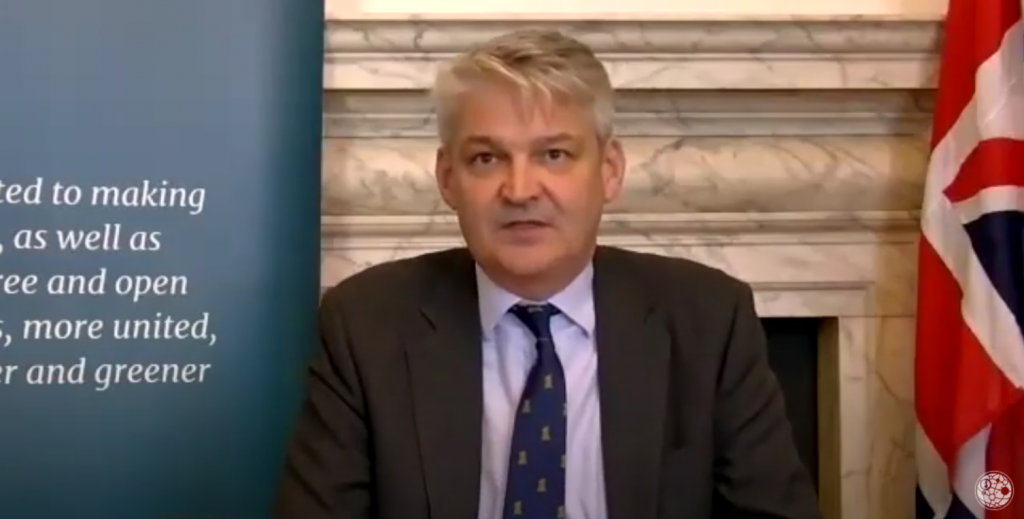Britain’s chief security adviser has said the world is closer now to “miscalculating” its way into nuclear conflict than it was during the Cold War.
The world is closer to “miscalculating” its way into a nuclear conflict now than it was during the Cold War because global superpowers understood one another decades ago in a way they simply don’t today.
That’s the chilling warning from the UK’s top national security adviser who singled out Russia and China and the “daunting prospect” of an increase in the number and types of nuclear weapons.
“We are entering a dangerous new age of proliferation,” Sir Stephen Lovegrove told the Centre for Strategic and International Studies think tank in Washington DC.
The remarks come during a time when Moscow has frequently made dark threats about its nuclear arsenal as the war in Ukraine rages on.
“What is happening in Ukraine is a manifestation of a much broader contest unfolding over the successor to the post-Cold War international order,” Sir Stephen said.
“It will decide whether we live in a world in which regionally-aggressive powers such as China and Russia can pursue ‘might is right’ agendas unchecked – or a world in which all states can ensure their sovereignty, competition does not spill over into conflict.”
Sir Stephen said that in the face of increased aggression from the likes of Moscow and Beijing, the West needed to think about a “new security order” rooted in arms control but also deterrence.

He also highlighted Australia’s role in keeping the peace through the AUKUS agreement.
‘Miscalculate our way into nuclear war’
During the Cold War – which saw the ideologically opposed West and Soviet Union stare each other down – the British adviser said the superpowers remained on talking terms.
“During the Cold War, we benefited from a series of negotiations and dialogues that improved our understanding of Soviet doctrine and capabilities – and vice versa.
“This gave us both a higher level of confidence that we would not miscalculate our way into nuclear war,” he said.
“Moreover, the Cold War’s two monolithic blocks of the USSR and NATO – though not without alarming bumps – were able to reach a shared understanding of (military) doctrine that is today absent.
“Doctrine is opaque in Moscow and Beijing, let alone Pyongyang or Tehran.”
Sir Stephen said that there was the “daunting prospect” of China modernising its nuclear arsenal including their size and capabilities.
In addition there were many other longstanding weapons agreements had “fallen apart as a result of Russian violations”.
He mentioned a phrase often attributed to UK Prime Minister Winston Churchill that “jaw, jaw is better than war, war”.
But the “jaw, jaw” – the dialogue and understanding of each nation’s position – were now lacking.
Sir Stephen pointed out Russia’s continued reassurances that it had no plans to invade Ukraine were worthless.
“Confidence and trust grow when states are open about their military capabilities and plans.
“That is why governments can report every year their national military spending to the UN, as well as their recent weapons transfers.
“I’m afraid is there any clearer example of the collapse of these mechanisms than the invasion of Ukraine?”
“Strategic stability,” he said, needed to be reset to ensure there was “no collapse into uncontrolled conflict”.
‘No immediate prospect of major powers coming together’
Arms control – which can only come about through further dialogue – was key.
“Binding legal frameworks should remain our long-term goal.
“But there is no immediate prospect of all of the major powers coming together to establish new agreements.”
As such “strategic risk reduction” should be the current goal.
“Confidence building measures” to “reduce cases of mistrust” were also key.
Sir Stephen said the UK strongly supported US President Joe Biden’s proposed upcoming talks with his Chinese counterpart Xi Jinping.
Top of the agenda is expected to be tensions over Taiwan – an independent, democratic nation which Beijing claims sovereignty over and the US has made increasingly more direct remarks about protecting.
Australia’s deterrent role
But it was important to back up dialogue with deterrence.
“In an age of revanchist aggressive powers, committed to the concept of spheres of influence, we must ensure that the vulnerable have the ability to defend themselves, thereby deterring aggression in the first place.”
Sir Stephen also highlighted Australia’s role through the AUKUS agreement signed with UK and US under the Morrison Government which should see Canberra receive a fleet of nuclear powered submarine. That would be a first for a nation that does not possess nuclear weapons itself.
“Integrated deterrence also means working in a more joined up manner across government and society more broadly.
“It means working more closely with our allies and our partners – through NATO, but also through new groupings such as AUKUS, and strengthening our relationships with partners in the Euro-Atlantic, Indo-Pacific and around the world.”
After World War Two, he said, the world had no template “for managing the atomic bomb’s destructive power”.
“So we created new frameworks. It took years. But it was possible. And it was done. And it was possible despite the advent of the Cold War.”
Source: news.com.au






